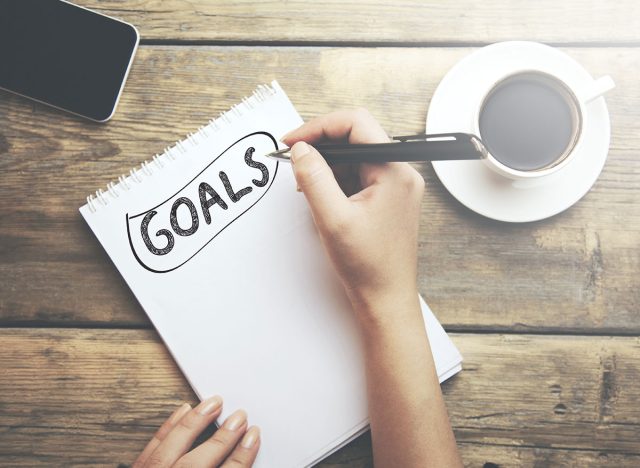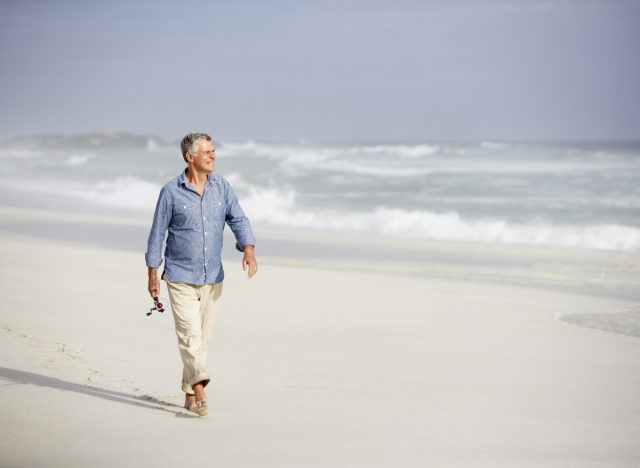The #1 Best Way to Stay Healthy in Older Age, New Study Says

There are no shortcuts when it comes to aging gracefully. If maintaining mobility, cognition, and overall quality of life well into old age was as easy as flipping a switch, we would all be running marathons at the age of 85.
They may be boring and bothersome at times, but habits like clean eating, regular exercise, and adequate sleep are undoubtedly the best ways to promote healthy aging. Similarly, plenty of scientific research tells us that simply staying busy, in general, via lots of hobbies, activities, and social events is a great way to keep the mind and body feeling young.
Now, it's easy to talk about living an active lifestyle for better aging, but usually much harder to stick to such a routine day in and day out. That's where the findings of a new supplementary issue of The Journals of Gerontology, Series B come into play. Swiss scientists have compiled nine separate scientific articles that support the same conclusion regarding healthy aging and how best to attain both happiness and good health.
Read on to learn the best way to stay healthy in older age, and next, don't miss 3 Major Secrets to Living to 99, According to Betty White.
Motivation is the "royal road" to healthy aging

Researchers conclude personal motivation is absolutely essential to healthy aging. This work, largely based on the Heuristic Model of Motivation and Healthy Aging, is centered on the idea that each individual's goals in life are achieved via motivation and determination, and, in turn, the value one places on said goals significantly influences that motivation.
In less scientific terms, motivation is the secret ingredient that can make healthy aging a reality. Individuals who are driven to continue working out, eating right, or simply pursue the subjects and hobbies they're passionate about are in a much better position to wake up feeling great on their 90th birthday.
"Taken together, the collection of papers in this supplement illustrates the central role of motivation for healthy aging, and the fruitfulness of the heuristic model of motivation and healthy aging for both basic and applied research," study authors write. "It is our hope that it inspires both strands of research and, with this, ultimately will make a contribution to addressing the question of how people can age healthily and fulfill their potential well into old and very old age."
Related: Sign up for our newsletter for the latest health and fitness news!
Set your goals

"We all hope to live well into old age in a way that fosters not only our psychological well-being but allows us to continue living meaningful lives and to pursue our goals. Goals are the states people deem personally desirable and want to achieve," research co-author Alexandra M. Freund, Ph.D., professor of psychology at University of Zurich, told VeryWellMind.
If your main goal is to stay healthy well into old age, and you can find enough motivation from that, you're all set! But, that certainly isn't your only option. It can be any positive goal you want to set for yourself. Learn a new instrument. Study a new language. Start collecting vintage comic books. It can be anything, as long as it is a goal you're passionate about that will have you ready to jump out of bed each morning.
"They provide direction and meaning, they motivate us to acquire new skills or maintain functioning, and give us a sense of agency and control to shape our lives according to our values," Dr. Freund adds.
Related: Over 60? Energize Your Days With This Morning Workout
Don't be afraid to switch goals

Of course, goals, values, and personal opinions change over time and can be influenced by other factors like context and environment. As such, don't be afraid to drop a goal if it just isn't working for you anymore. The wrong goal can be just as detrimental to healthy aging as no goal at all.
At least some of the goals you set for yourself at 30 will probably be quite different from your goals at 80—and that's fine. With old age comes unavoidable life changes such as retirement, and at least some loss of both physical and cognitive prowess. In one article within the supplementary issue, the researchers write: "Older adults' ability to age healthily and maintain a good quality of life critically depends on how well they respond to these challenges by adjusting their goals."
Related: 60-Second Workouts That Can Add Years to Your Life
Figure out what motivates you

This research can benefit anyone and everyone, but at the end of the day, only you can really determine what motivates you.
Some prefer intrinsic or internal motivation, such as the drive to one day play with their grandkids, while others may respond more to external motivators, like the desire to win an award or reach a major milestone. One isn't better than the other, as long as you're passionate and motivated.
Remember, no goal is too small, silly, or trivial if it motivates you and gives life just a little more meaning.
"Thus, if we want to understand 'healthy aging,' we need to understand what it is that people 'have reason to value' into very old age, and how they can attain and maintain these valued aspects of their lives," the study authors write.
For more, check out The Best Weight-Loss Exercises If You're Over 60.








